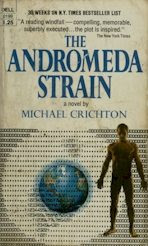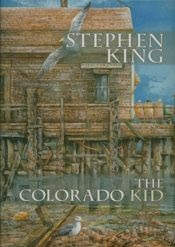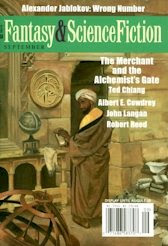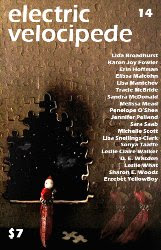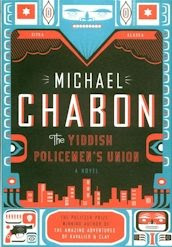Of the five novels nominated for this year’s Hugo, one is easily my favorite, one is far-and-away the worst, and the other three are difficult to rank.
Starting with the good news, I thoroughly enjoyed
The Yiddish Policemen’s Union by Michael Chabon. For me,
The Yiddish Policemen’s Union worked on every level. It is an excellent alternate history, cleverly following through on the implications of a single alteration of history – that the Jews who settled in Israel after World War II were driven off and relocated in Alaska – while at the same time using that variation on history to illuminate aspects of human nature and Jewish culture. The novel also works well as a murder mystery. Most importantly, it is an outstanding character study of Meyer Landsman, the detective seeking to solve the central mystery. Based entirely on the novel’s own merits, I would love to see
The Yiddish Policemen’s Union win the Hugo Award. The fact that the author is a Pulitzer Prize winner yet would actually be pleased to win a Hugo is merely a nice bonus.
Moving to the bottom of the list, sometimes a singer writes a song that requires a voice stronger than his own, and he would be better off handing the song off to someone else to perform. That is what happened to Robert Sawyer with
Rollback. In
Rollback, an octogenarian couple undergoes rejuvenation therapy, but it only works for the husband, so he is suddenly sixty years younger than his wife physically. This would make for a heart-wrenching story, in the hands of a writer skilled in conveying complex human emotions. Robert Sawyer is not. His strength is scientific speculation, not human drama. His dialogue is wooden and dull, his characters so one-dimensional that it is obvious even Sawyer does not conceive of them as real people. Then again, perhaps it is best that the protagonist is such a non-believable character, otherwise I would have been very annoyed with him for moping through most of the novel over his terrible misfortune of being given an extra sixty years of life. A further disappointment with
Rollback is that Sawyer's future year 2048 is terribly unimaginative, indistinguishable from the present day but for a few housecleaning robots and passing references to the weather being a little warmer than it used to be. Nothing else has changed, or if it has, the main characters are oblivious to it. They go around quoting
Seinfeld and
Star Trek and
Lost in Space, but never make a reference to anything past the turn of the century. I hate to think that there are any people, even at the age of 87, so detached from the world around them; if there are, you wouldn't want to make them the viewpoint characters of a futuristic science fiction novel.
Ranking the remaining three novels is a close call for me. In the end, I’m going with
Halting State by Charles Stross as my second choice, because it is successful as entertainment but also has something interesting to say.
Halting State starts with a premise that sounds silly, the investigation of a crime that occurred within an on-line role-playing game. But the novel goes at it with such gusto that I found myself drawn in completely, and was easily able to suspend my disbelief even when the initial crime broadens into intrigue and espionage of global import. The novel is fun to read, and (in sharp contrast to
Rollback) also has a lot of interesting speculation and commentary on our near future.
For me, the remaining two nominees suffered from opposite deficiencies. Ian McDonald’s
Brasyl is an interesting novel. I like the concept of a science fiction novel about Brazil, alternating between past, present, and future timelines, interconnected through the device of quantum physics. Yet I found
Brasyl rather difficult to get into. It takes the story too long to get moving, and the writing style of the present and future threads is off-putting. The entire novel is loaded with Portuguese terminology and the present and future scenes add an ultra-hip sensibility that I gather is meant to convey the feel of Brazilian culture, but for me made the novel too difficult to read.
Conversely, John Scalzi’s
The Last Colony, about efforts to establish a new human outpost on a faraway world, is easy to read and quite entertaining but rather less ambitious than the other nominated novels. It is the third in Scalzi’s series begun with
Old Man’s War, and suffers from Scalzi's determination to resolve various loose threads from the previous two volumes. The story does not present its individual characters with the kind of internal conflicts that were a strength of the prior novels (for example, Jared Dirac's identity crisis in
The Ghost Brigades).
The Last Colony has an enjoyably fast pace and some snappy dialogue, but a bit less to say than the earlier two
Old Man books, notwithstanding all the galactic politics that come into play in the second half of the novel. Scalzi has a strong following and will surely get more shots at the Hugo; I would like to see him win it for a work with more depth.
Aaron's Ballot:1. Michael Chabon – The Yiddish Policemen’s Union
2. Charles Stross – Halting State
3. Ian McDonald – Brasyl
4. John Scalzi – The Last Colony
5. Robert J. Sawyer – Rollback
 Time for me (Amy) to post some miscellanea, namely, here's a music review. For a tangential SF/F reference, I bought this CD in August during Worldcon here in Denver.
Time for me (Amy) to post some miscellanea, namely, here's a music review. For a tangential SF/F reference, I bought this CD in August during Worldcon here in Denver.






